This year, the BRIT Awards will make history as the event is held on a Saturday night for the first time ever. Of course, that's just the tip of the iceberg when it comes to talking points ahead of a show that will see performances from Harry Styles, Wet Leg, Cat Burns, Sam Smith, Stormzy and more. This year's nominations attracted fierce criticism for the all-male Artist Of The Year shortlist and the absence of R&B from the Pop/R&B category, while the debate about the role of the BRITs in the modern industry continues to rage. Here, Music Week meets this year's showrunner and Atlantic radio king Damian Christian, plus BRITs committee member Mel Rudder and trophy artist Slawn, to go deep on all of that and much more...
WORDS: James Hanley
PHOTOS: Lorna Allan
Juggling two high-powered day jobs with organising the biggest night in British music sounds like a herculean task. But for BRIT Awards 2023 showrunner Damian Christian, he says it’s often been, quite literally, a walk in the park.
“I’m a real early bird,” shares the venerable Atlantic Records UK MD and president of promotions. “I’m renowned among some of my contacts for putting calls in and texting while I’m out walking my dog at 6.30am, so I get in nice and early ahead of my rivals. The dog walk is actually really helpful.”
Christian has come to lean on these strolls with his cocker spaniel Tinker as a daily source of inspiration, coming up with most of his ideas for the BRITs in his local park, or on regular calls with long-standing BPI execs Maggie Crowe and Sally Wood. Indeed, he is convinced that being constantly on the move helps stimulate his creative juices.
“I live in West London and sometimes in the afternoon, rather than sit behind a desk, I’ll go to Richmond Park with the dog – especially when there’s lots going on – and I find that’s when I get some of my best creative thoughts,” he explains. “I like being out and about rather than being stuck in one place.”
And there has been a lot to reflect on ahead of this year's ceremony. There have been some big changes, and even some controversy, too. After taking the decision to drop its gender-based categories in 2022, the BRITs introduced Artist Of The Year and its international equivalent as two new categories, a move which resulted in women claiming the most awards, with a triumphant Adele scooping the night's top honour. Yet ever since the 2023 nominations were announced back in January, the BRITs has faced a backlash, primarily for its all-male Artist Of The Year shortlist – featuring Central Cee, Fred Again.., George Ezra, Harry Styles and Stormzy – and the absence of R&B from its Pop/R&B category, where the nominees are Cat Burns, Charli XCX, Dua Lipa, Styles and Sam Smith.
It’s clearly a busy time for Christian when Music Week succeeds in pinning him down over Zoom to discuss his role as BRIT Committee chair for 2023 to discuss all of this and much more. He has picked up the BRITs mantle from Geffen Records president Tom March, who oversaw the 2022 ceremony in his former life as Polydor co-president. And in terms of tenure, Christian has certainly earned his shot.
“I thought 1987 was my first BRITs, but I didn’t start working for RCA Records until the October, so it was 1988,” reminisces the veteran executive. “It was in between the Royal Albert Hall and Dominion Theatre and it was such an exciting thing to get your BRITs ticket. In those days, if you were one of the newbies, you weren't told until the day, so you'd bring in your suit – if you had one – in the hope you were going to get the Willy Wonka golden ticket, but I was lucky enough to go.”
“I've been every year since '88 and they’ve been some of my best ever nights,” he adds. “Some I don't remember as well as others – the '90s were quite a lively time of enjoying ourselves and misbehaving!”
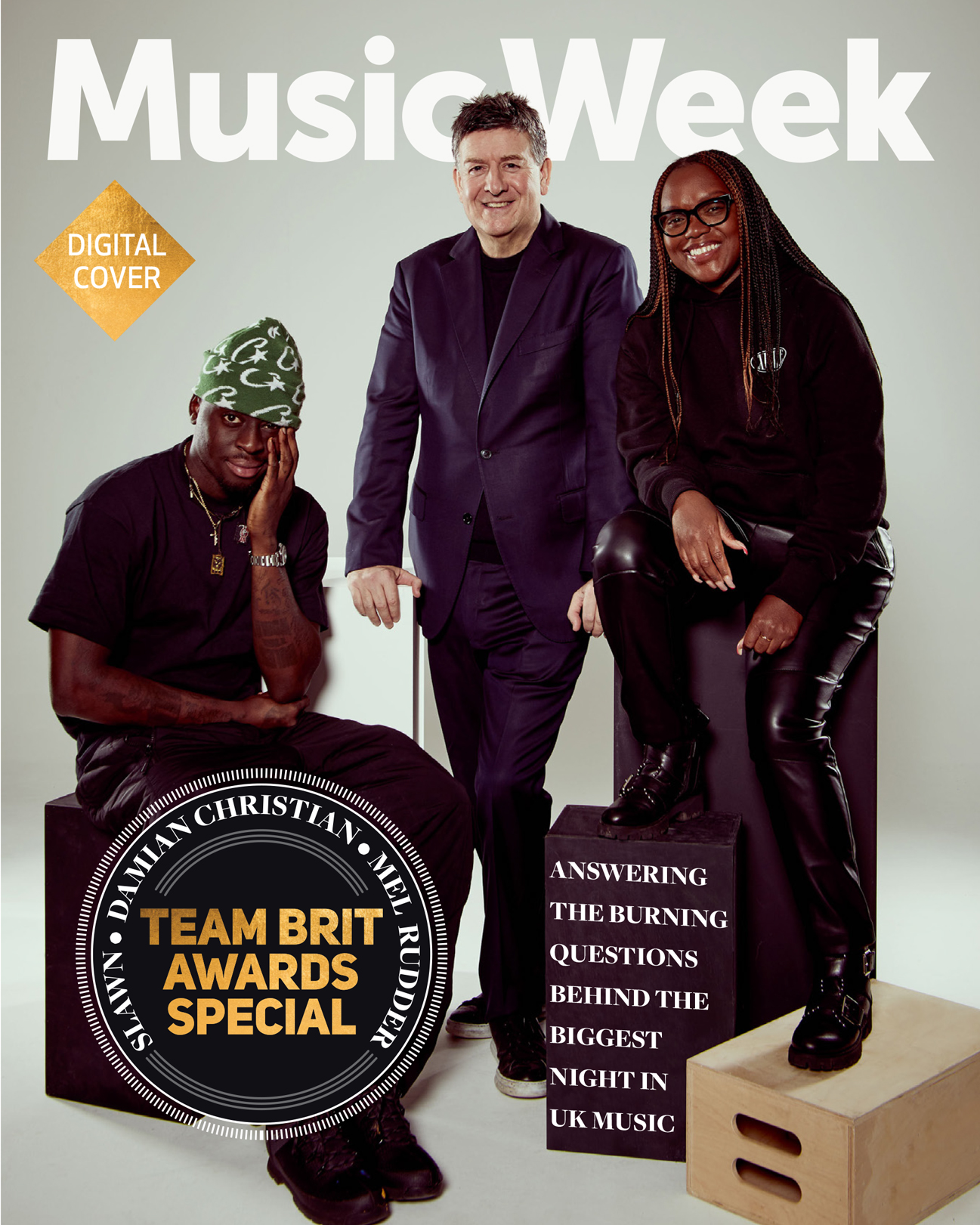
One year Christian remembers all too well is the calamitous 1989 event, hosted by Mick Fleetwood and Samantha Fox, although he defends the method to the madness.
“Hopefully we won't be recreating that one,” he says. “What makes me laugh about it though, is that it wasn’t a bad idea. It was obviously record companies sitting down over a boozy lunch and thinking, ‘Who's one of the biggest rock stars in the world? Mick Fleetwood – he's got a great sense of humour and he's a superstar.’ Madly, I knew Samantha Fox a little bit because I was working for [then BBC Radio 1 DJ] Gary Davis at the time. She used to do PAs at the shows we were doing and was very sweet. Again, she was popular and somebody must have thought, ‘Let's put those two together, it's bound to work.’”
Christian chortles at the memory.
“Of course, it didn't work quite as well as they were hoping because they'd never done the live TV presenting thing,'” he says. “So I think the idea was probably quite good, but good ideas don't always work out.”
A serial Music Week Awards winner, Christian and his Atlantic promotions team collected nine gongs in a row from 2009-17 (most recently claiming the 2022 crown), while his acceptance speeches (sample quote, “We come in peace, we leave you in pieces,” borrowed from 1989 made-for-TV hooligan flick The Firm) have been a recurring source of banter on the UK industry’s other favourite night. The view from this side of the fence, however, is a whole new ball game.
“What happened was that [Warner Music UK CEO] Tony Harlow asked me to be the Warner rep for last year’s BRITs,” recalls Christian. “I like going in for the plug and trying to get our acts on, but I thought, ‘Why not?’ It wasn't anything like what I'm doing now, but I saw the bigger picture from the other side.
“Tony hinted about me [taking the BRITs hot seat] this year and I wasn’t sure, but then he asked me more formally and I thought, ‘Why would I not want to do it?’ Because it's such a huge honour. He said, ‘I think you'll be good at it and will be able to handle it.’ Like I said, I think you've got to be a certain character to take it on and not have sleepless nights.”
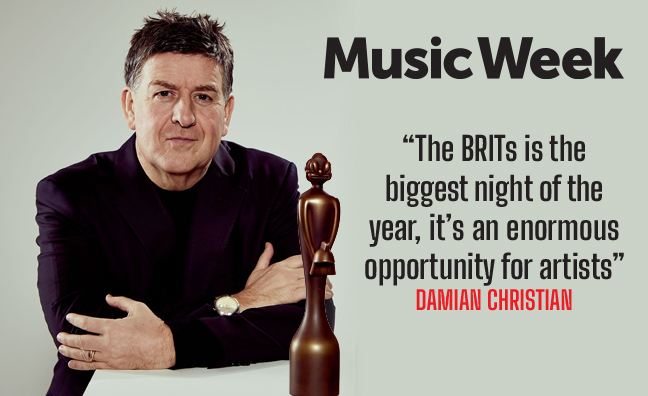
Reassuringly, he describes his current workload as “hectic rather than stressful”.
“It's been all-consuming, but enjoyable,” reflects Christian. “I'm not really a stressful person. If you're a stressful type of person, I don't think it's the job for you because they’re long, busy days and your phone is going 24/7. I set out to enjoy the whole process from start to finish and 99.9% of the time, I've thoroughly enjoyed it. But it just doesn't stop, it's this monster that you're involved in.”
That monster will come to life at The O2 in London on Saturday, February 11 – the first time the event has ever been held on a weekend. Harry Styles, Lizzo, David Guetta, Lewis Capaldi, Becky Hill, Cat Burns, Stormzy, Sam Smith & Kim Petras, Ella Henderson and Wet Leg are lined up to perform, with Mo Gilligan hosting for a second year running. The show will be broadcast live on ITV1 and ITVX.
After consecutive years of Covid restrictions, the ceremony will revert to normal service with the return of table seating on the arena floor.
“It’s back to table-gate as they call it, because everyone always wants certain tables,” laughs Christian. “Luckily, that's not really my job, I'm happy to say that gets passed on! But they're back and I think that's a positive thing for the BRITs because the table chats with the host are always some of the best bits.”
The 2023 awards statues were created by London-based, Nigerian-born artist Slawn, whose three individual designs have been hailed by Christian as “incredible and powerful”.
“It’s the biggest thing I’ve done so far,” Slawn tells Music Week. “It’s going to be something hard to top but I am definitely going to top it. Growing up in Nigeria, I didn't know what [the BRITs] was. But there was a clip of Kanye West at the BRIT Awards when he performed All Day. I’d seen Taylor Swift’s reaction and that’s when I became obsessed with her and the idea of making people react like that, I always want people to react to my work like that. I have screenshots of that moment on my phone. I cried when I watched it.”
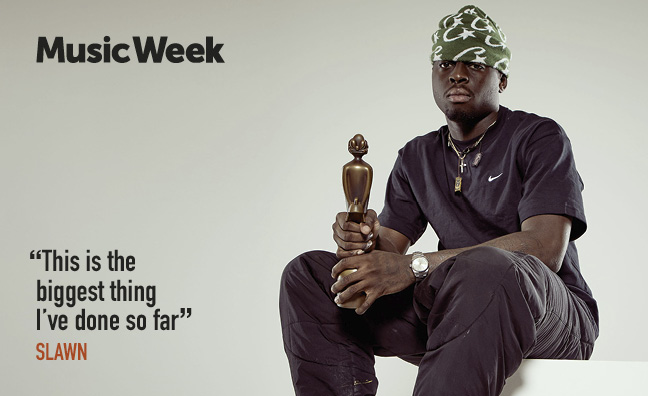
Slawn, who removed the traditional helmet from the trophy to say "hats off" to the BRITs for giving him the opportunity, reveals that he's learned a lot from being part of the event.
"I've learned that the people that run it are beautiful people, I love Maggie [Crowe - BPI Director of Events & Charities]," he says. "She's like my favourite person in the whole world. Shout out Maggie. [And also] the small stuff, even going to the [BRIT] School and seeing what they could do. Like, a young me would have loved the idea of the BRIT School. Because I didn't think that was possible. So that's the most exciting part. We just show people that it's possible. That's the whole point of this thing. Your job, my job, everyone's job, is to be able to inspire and have people look and be like, 'Okay, I can do it too.' Aside from that, the reaction was crazy. People said a lot of nice things. People said mean things. People said bright things. People said dark things. I think that's what's exciting about doing work. It's the reaction most of the time. Not the work, not the product, but the process and the reaction."
Slawn is pleased to be part of a community of artists and musicians from the African continent making waves around the world.
"Now everyone just wants to hop on the swag and we have no problem sharing it," he says. "We can learn from you and you can learn from us, humans can come together and make the world a better place."
And who, we ask, would he most want to see holding a trophy?
“Taylor Swift,” he says. “And if not her than Cench – Central Cee.”
The West London rapper is up for two gongs at the bash, while Grammy winners Harry Styles and Wet Leg lead the way with nominations for four awards each. Other artists up for multiple awards include Beyoncé, Ed Sheeran, Eliza Rose, Lizzo, Aitch, Cat Burns, Dave, Sam Smith, Nova Twins, Arctic Monkeys, Stormzy and Taylor Swift. Atlantic lead the way with 12 nods, but there will be no special favours from the man in charge (“I can't decide who wins the awards, so I feel pretty relaxed on that,” he insists).
A longtime Christian cohort, Three Thirty Music plugger Mel Rudder, is serving as Warner’s rep on the 2023 committee. Rudder has worked with the label for more than 15 years and was formerly in-house at Atlantic.
“I’ve worked closely with Damian for many years and I respect him as a leader in this business, so I welcomed the opportunity to work with him on the BRITs,” says Rudder. “We really understand each other so no topic was off limits. We continuously bounced ideas and I really felt that my opinions were valued and listened to, especially on key matters. We were collectively able to respect the traditions of the awards whilst building key cultural moments into the programming and output this year.”
Uppermost in Rudder’s mind is the reaction to the Pop/R&B shortlist, which was called out by Tiana Major9 and Mahalia for its complete absence of R&B, leading to calls to introduce a standalone category.
“For me personally, it was important that I was able to bring a new voice to the table with an aim to represent the often underrepresented voices in key conversations at a top level,” she says. “For example, I feel it is important this year to address the need for a standalone R&B category in the awards as it is a genre that can afford to stand on its own two feet and we have some great talent coming out of the UK that deserve to be recognised on home soil for their contribution to the genre.”
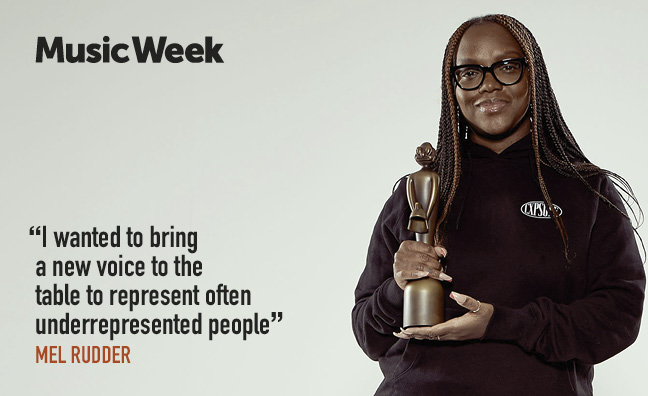
Hits proved a stumbling block.
“We didn’t have enough big hits to get the decision over the line for this year’s awards,” Rudder says. “I’m confident that the right conversations are taking place and will continue in the hope that that changes in the future.”
Having been part of the BRITs from the inside now, Rudder says she has learned a lot about how it all comes together.
"I’ve attended the BRITs many times but the nominations process was always still a bit of a mystery to me," she says. "So when I joined the committee it was an opportunity to get real insight into the inner workings of the awards, and learn as much as possible about the variables that contribute to the nominations each year. I was surprised to see how many data sources contribute to the decision-making process, whether you agree or not, the analytics and data play a huge part of the decision-making process. It’s not always done on passion alone. The recruitment of the voting academy is also extremely detailed and I was impressed with the focus and emphasis on being as balanced as possible, to ensure a fair voting procedure is followed."
Now, without further ado, it’s time for Damian Christian to respond at length to tell us what's in store for the biggest night in British music, answer some of the criticisms, relive his favourite BRITs memories and talk up the opportunities presented by that Saturday night primetime slot…
As the executive fronting it all, what does it mean to you to be running the show?
"I'm incredibly proud to be doing it. I feel privileged to be asked. Although I'm the MD for Atlantic, I'm still seen as the promo guy – which I love because it's in my blood – but I don't think many promo guys have had the opportunity to be chairman of the BRITs as well.”
From your perspective, what do you think it takes to do the BRITs well?
“It's having the experience to deal with all sorts of characters: from management, to promo, to label bosses. There were no favours to anybody, it had to be what was best for the show. They know that I'm no-nonsense, but also very fair and I do things with a sense of humour. I don't take myself seriously, but I take the job seriously...”
Let’s address the controversy over Artist Of The Year. The 2022 BRITs was hailed by many for removing gender categories in 2022. While 42% of nominations across all categories were for women artists or mixed groups this year, the Artist Of The Year award has attracted criticism for only having five men. Is there anything with hindsight that the BRITs should have done differently to make it more inclusive? For example, is the criteria too prohibitive? Is the shortlist too short?
"I want to start off by saying how disappointing it was to see the lack of female representation in this year’s Artist Of The Year category. There’s so much incredible British female talent out there – and across the categories it was almost a 50/50 split between men and women – but unfortunately many of the UK’s major female artists weren’t in cycle last year, so didn’t meet the criteria for Artist Of The Year. The BRITs made the brave move of getting rid of gender categories in 2022 to try and make sure the UK’s biggest night in music was inclusive to everyone. We’re only in the second year of [having] no gendered categories and still in the process of learning and listening so that future generations can feel as included and as represented as possible.
"That being said, if you look at the 2021 show, women took 10 out of the 15 awards on the night and Adele was named Artist Of The Year. So I don’t necessarily think the criteria is too prohibitive, it was just unfortunate that so many great female artists were out of cycle in 2022. We don’t put a limit on the shortlist for who’s eligible for Artist Of The Year – whoever meets the criteria is in the running and put before the Voting Academy. And the criteria to make the shortlist is you’ve had to achieve at least one Top 40 album or two Top 20 singles – which we think is a fair measurement if you want to be considered the year’s biggest artist.
"Like every year, after the show we will have a debrief and decide on any changes to categories, eligibility and criteria. However, with the categories only changing last year, I think it would have been unfair for us to revert back to gender categories so soon. I know there’s some amazing music from female artists set for this year and I’m hoping there’s a healthy representation for Artist Of The Year at next year’s BRITs."
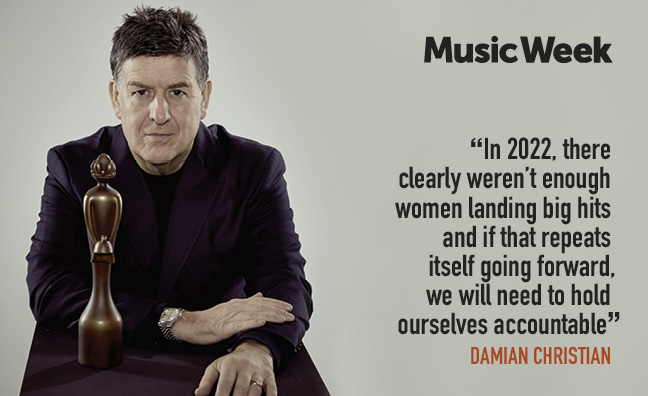
Among artists who could have been eligible were Florence And The Machine, Rina Sawayama and Atlantic’s own Charli XCX, who had a No.1 album. As someone who works to break artists, are you concerned that women solo acts have – albeit unintentionally – appeared to have lost a key platform in that BRITs category? Will there need to be a rethink to ensure women can build a profile with the BRITs, or are other categories – including Rising Star – enough to do the job?
"The Rising Star award has definitely helped British female artists build a profile, with so many incredible women having won that award and gone on to have amazing careers. The last two years alone have had all female shortlists and I’m sure we’ll see these artists start to pick up nominations across all the categories very soon. You look at FLO and are just blown away by their talent. And then you have Cat Burns who is just fantastic and will get the chance to perform on the night which will be a really special moment and a great platform to kick-start her year. We also have performances from Lizzo, Becky Hill, Ella Henderson, Wet Leg and Kim Petras – so there’s still opportunity to showcase female artists and build their profile. We’ve seen over the years that a great performance can be just as much of a boost as an award win."
Of the long list of eligible artists – only 13 out of 71 were women or non-binary artists (17%). It has been stated that fewer higher profile women artists were eligible this year because they did not release recordings that met the criteria. Is that an anomaly, or do you think this points to a wider systemic issue in terms of what talent is actually being given regular pushes by labels and given the chance to succeed in the first place?
"Speaking from an Atlantic point of view, we treat every artist with the exact same love, care and dedication. And we work hard to ensure that all our artists have the best opportunity to enjoy success. Now on a wider industry and social issue, I think there is always room for improvement when it comes to inclusivity and what is fair. We’ve come a long way as an industry in the last few years and we want to keep pushing forward. Looking at the Rising Star shortlist alone over the last few years, we can see up-and-coming female talent is being supported and promoted. And last year saw 10 women win a possible 15 awards. However, in 2022 there clearly wasn’t enough women landing those big hits or albums and if this repeats itself this year and going forward, then we’ll need to have discussions as an industry and hold ourselves accountable."
The Voting Academy comprises approximately 1,200 people from across the industry – just over half who voted identify as women and 31% as Black, Asian, Minority Ethnic. Are you happy with that balance? Do you think the AOTY shortlist suggests that more work needs to be done?
"The Voting Academy gets reviewed and updated every year. We’ve worked hard over the last few years to modernise it and six years ago set ourselves the target of making it a 50/50 split of male and females and to ensure at least a quarter of voters were Black, Asian, Minority Ethnic. So I think we can look at the percentages this year and be happy with the balance."
Another category that courted controversy is pop/R&B, which attracted criticism from artists including Tiana Major9 and Mahalia. Will that category need a rethink next year? Does R&B need its own category? What would you say to those who say its name isn’t fit for purpose?
"It’s really important to me that R&B artists and fans know how much we value R&B at the BRITs and how much we respect it as an art form. For this year’s show, we looked into the criteria and the categories in real detail and, it’s a shame to say but there weren’t enough artists that managed to get a Top 40 single or album to create a separate R&B category this year. Like always, we’ll listen to artists, managers and labels after the show, and review any areas we feel we can improve on, and the Pop/R&B category will be an important area in these discussions following the commentary we've heard over the last few weeks. The genre awards are designed to celebrate success, but if some artists feel they have been overlooked in the process then further discussions and review are needed to hear how things could be done differently in the future."
How would you sum up your vision to take the BRITs forward?
“I suppose the vision was [holding the show] on Saturday night. I thought it was a real long shot, but that was the goal and we got the number one thing we were after. I'm super-proud of that and incredibly grateful to ITV for giving us the chance. There was a big push, but I think it's been pushed before by Jason [Iley, Sony] and David [Joseph, Universal] and probably Tom [March]. I don't know how much of it was skill or luck, or a mixture of both, but the main thing is that we got it.”
What do you think a Saturday slot will do for viewing figures?
“You’re hopefully going to get more viewers, although some people don't like music on TV so I'm not sitting here thinking we're going to go through the roof. I'd like to get some decent numbers behind it. I mean, what's the worst that can happen – that it goes back to a Tuesday or a Wednesday? It might go back to Tuesday or Wednesday regardless because of schedules, so there's no guarantee that it would be back on a Saturday even if it did really well. But we have to try it and make the most of it. It feels a bit more glitzy having it on a Saturday. You've never had to worry about people letting their hair down at the BRIT Awards, but people haven't got work the following day so it'll be a bit more relaxed. It will be interesting to see.”
Can you tell us what we can expect from the performances on the night?
“What we were looking for was as many of the acts performing their big single, and that hasn't always been the case at the BRITs. I've been on the other side where an artist wants to do a particular song and they're adamant, and that doesn't always translate [well]. There are eight acts on and it's like a jigsaw; it is about getting the right order and the right mix. Having a big opener is ultra-important. Last year, it was Ed Sheeran and Bring Me The Horizon, and that was all Ed's idea. I'd like to claim it but he came up with it and it was one of the highlights.”
Harry Styles is an even bigger star than the last time he performed at the BRITs, what have you made of his career trajectory?
“I'm delighted for Harry Styles because I’ve always found him incredibly polite, lovely, brilliant and funny. After he performed at the BRITs a few years ago, we had a frank conversation and I said, ‘I'd never have dreamed that you'd be making these amazing songs after being in One Direction.’ And rather than telling me to piss off, he went, ‘Oh thanks man, that's really nice.’ It's almost a bit embarrassing looking back now that I was giving him some seal of approval that he didn't need, so seeing him come back with maybe an even bigger, stronger record is great. He's a phenomenal artist.”
Then there’s Stormzy, who you worked with from an early stage…
“With Stormzy, it's quite personal because I was working with him before he was even signed to Atlantic. I've got such fond memories of going to meet him in his flat in Chelsea; I was thinking we were going to go for the specialist radio stations and he piped up and went, ‘I want to do some cookery programmes. I definitely want to be doing X Factor judges' houses. And my mum listens to Magic and Heart.’ I played along because I wasn't sure if he was taking the Mickey, but he actually meant it and he made me promise. He said, ‘Big D, you definitely going to do this for me?’ Anyway, we got in judges' houses, he was on Magic and he's done every programme that he wanted, so I look back on it now with real pride. I’m sure he'd have done it without me, but we were part of his success at a very high level. Stormzy, without doubt, had two of the most iconic BRITs performances over recent years. One of my favourite moments was when Ed Sheeran was adamant about bringing him on [in 2017] to do Shape Of You. Stormzy was just starting to cross into the mainstream. I get shivers talking about it even now.”
Every year some critics will call into question the importance of the BRITs. Do people underestimate the power of the BRITs as a star-making opportunity, especially on a global scale now given the digital reach?
“Well, as record labels, we all realise it's a big opportunity. Hence, I've been getting plugged left, right and centre by so many people. I think it's fair to say it's the biggest night of the year in the music calendar. It's an enormous opportunity: from the figures, to the press, to the online stuff. Getting nominated is brilliant, winning an award is amazing, and performing on it is everything to a lot of artists.”
What about in terms of sales boosts?
“There have been spikes for the last x-amount of years, but they've not been enormous. There’s normally one or two winners of the night that jump up the charts, but it's more about the long term, especially with the newer acts. The trouble is, it's so much harder to break artists and sell records than it used to be. You always want more, but I know how hard it is to break acts because I've been doing it all my life. Sometimes you can get lucky and they break really quickly and others [take longer]. A good example is Mahalia, who we’ve had signed for 10 years; Charli XCX was 10 years. But if this year’s BRITs helps move things on a bit for certain acts, then I'll be happy with that.”
You mentioned Mick Fleetwood and Sam Fox earlier and there were multiple flashpoints through the ’90s, are you always secretly hoping for a bit of controversy at the BRITs?
“Being honest, if something controversial happens, it's normally brilliant. It's the talking point and the press goes nuts. But you're not willing it on and you're also not trying to make it happen because people would see through it. But I think the world has changed as well – the acts aren't as badly behaved as they used to be.”
Finally, how will you gauge the success of this year’s event?
“If my wife's still talking to me! Because she thinks I've been on the phone even more than normal if that were possible. So what will success be? It'll be more about the things I could have changed, and you won't be pleasing everybody, that is for sure. I think the performances will be brilliant, and that's something I have been able to influence. But I'm not here to please everybody, I'm here to be fair. It's a big team and I don't feel it's all on me. It's a team effort – win, lose or draw.”











